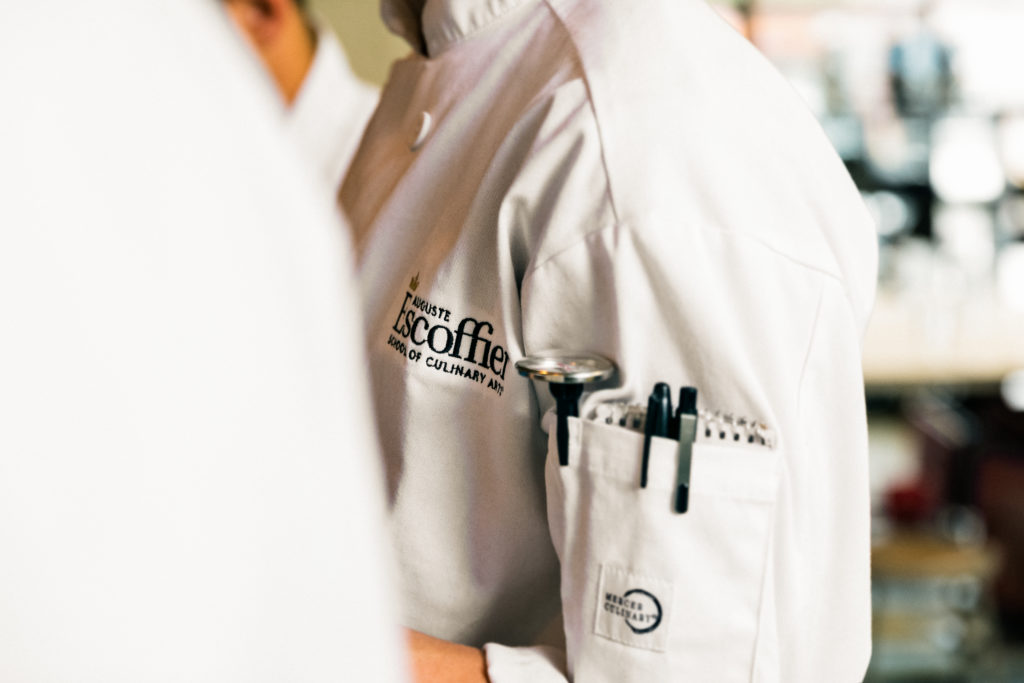The professional kitchen is a very different work environment than a corporate office. But getting a job in both places starts out the same way — with a resume. As the first point of contact between a cook and the hiring manager, the purpose of the resume is to highlight your experience and culinary education, so that the employer can decide who moves onto the next step — the interview.
By following these tips (and avoiding some pitfalls), you can make your resume the best it can be. Plus, you’ll improve the chances that your resume lands in the “to call” pile instead of in the trash.
Should I Call Myself a “Chef” on My Resume?
It’s important to remember that the title of “Chef” is earned with many years of experience in the industry. Calling yourself a “Chef” on your resume without earning the title could be viewed negatively by potential employers. Even getting a degree or diploma from a culinary school isn’t enough…though it’s a great start, and can potentially give you opportunities for advancement faster than those who do not have the same credentials.
The appropriate title for most people starting out in the industry would be “Culinary Professional,” and that’s what we provide in the examples in this article.
Make It Skimmable
Unless you’re just starting out in the industry, it’s hard to condense a resume into a single page, as resume experts recommend. But consider it from the hiring manager’s perspective. They could get dozens of resumes to fill a single job opening. If each resume were several pages long, it would take ages to read through them all.
To make your resume easy to read and absorb, it’s important to keep it skimmable. The goal is to grab their attention when they’re in the first “weeding out” phase. Therefore it’s important to highlight your culinary education and skills on the top third of the page. After the hiring manager narrows down the selection, they’ll probably go back to read the resumes more thoroughly. We want to make sure your resume makes it past the first round of reviews.
Keep your resume skimmable by breaking it into sections and using bullet points to highlight key experience and accomplishments.
For each previous role, start with a short description of how you contributed to the overall success of the daily operation of the kitchen. This might include how you helped to increase consistency, improve output, maintain teamwork, reduce food waste or recooks. Anything you did to help improve the overall functioning of the kitchen. Then, call out two or three accomplishments from each position in a bulleted list, like additions to the menu that performed well, positive work with high-profile clients, and other successes.
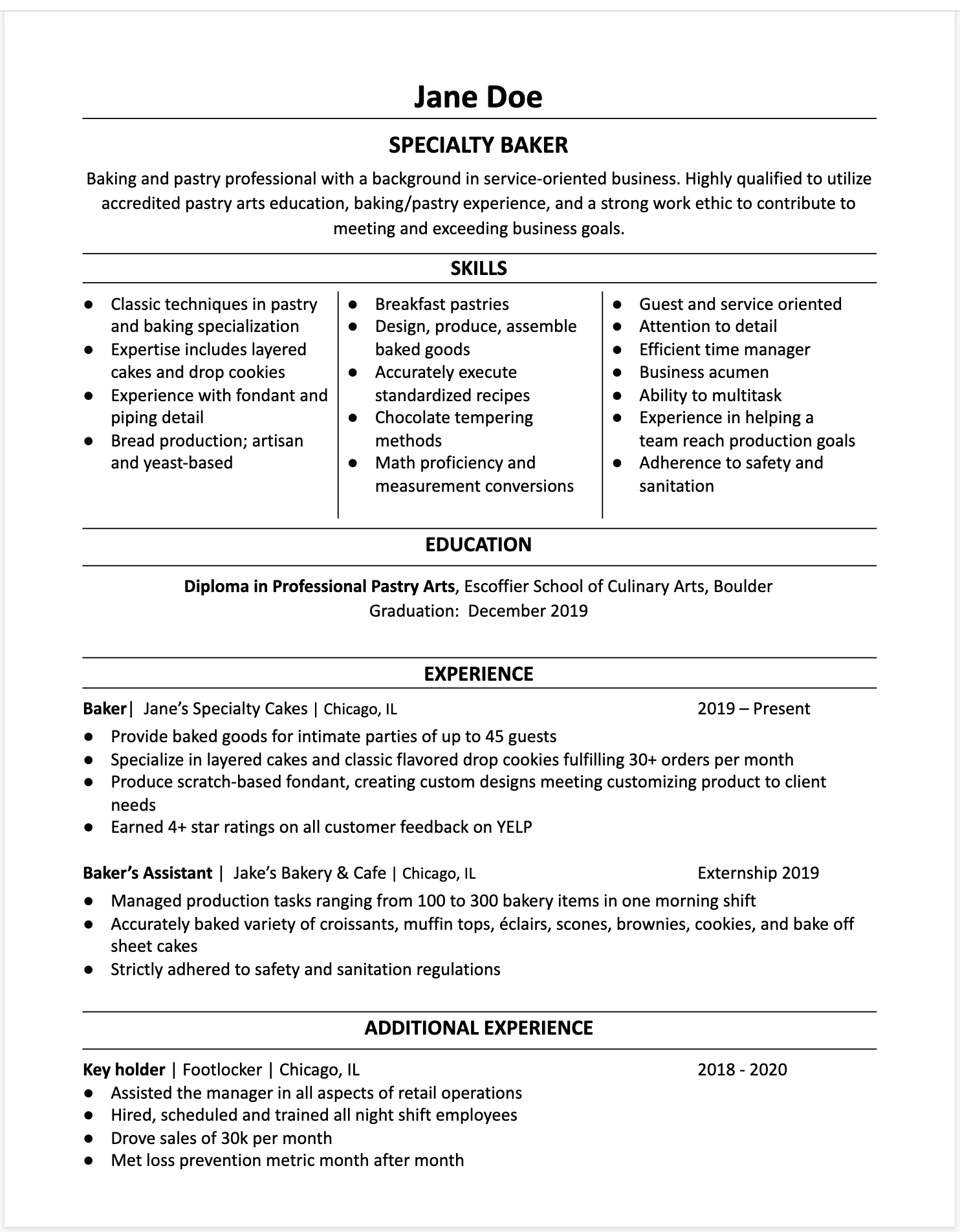
Click here to view a pastry career changer sample resume
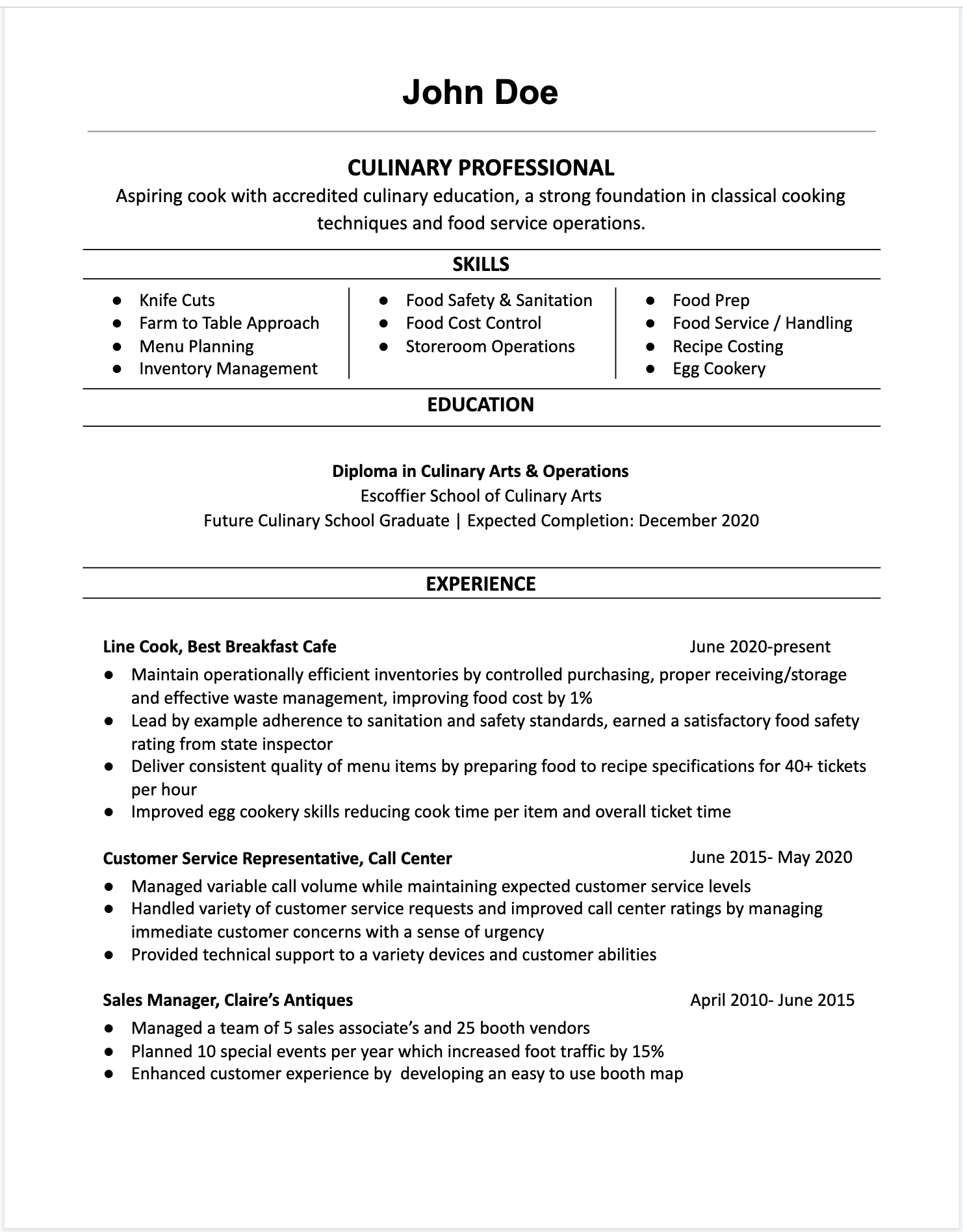
Click here to view a culinary career changer sample resume
The further in the past a job is, the less detail you should include. Your current or last job is much more telling about your skills than a job from 10 years ago.
Based on feedback from chefs we recommend a separate “Skills” section. This is another short, bulleted list that calls out some of your specific knowledge like knife skills, ability to follow recipes, knowledge of cooking techniques, baking fundamentals, or knowledge of inventory processes. Be sure to include transferable skills, like “works well under pressure,” “able to take constructive criticism,” and “team player.” This makes it easy for the employer to see what cooking or non-cooking skills you bring to the table right away.
“My education with Escoffier has really given me a good foundation. It has filled a resume gap; it’s filled a professional gap and a skills gap. It has helped me in all aspects of my culinary career.”
Lance McWhorter, Online Culinary Arts Graduate, Food Network “Chopped” Contestant, and Chef/Owner of Culture ETX
Another important point of skimmability is to give the reader’s eye a place to rest. Don’t cram the single page full of text from edge to edge. Leave some white space on the page to clearly separate each section.
Tweak Your Resume for Each Position
The best culinary resumes are tailored for each position you are applying to. Your resume should contain wording that matches key phases found in the job description and anything else you know about the job setting.
For example, if you’re applying to work at a steakhouse, call out any details from previous job experience that would apply. Maybe you worked the grill station at a busy American restaurant that had steaks on the menu. If the job description says you’d be writing the schedule for the line and prep cooks, mention any previous scheduling experience.

Customizing your resumes like this takes a bit more work up front, but it shows the employer that you meet their preferences and may help you to get that interview.
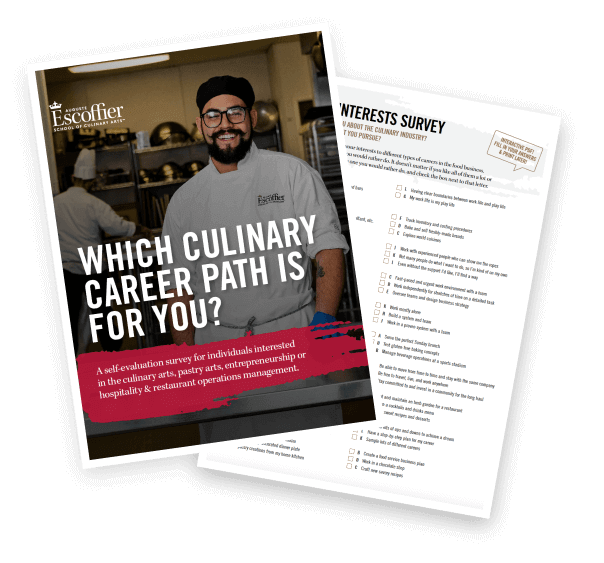
Take the Culinary Career Survey
We’ve compiled a checklist of all of the essential questions into one handy tool: career options, culinary interest surveys, educational opportunities, and more.
Quantify Your Experience
Cooking skills are hard to demonstrate on a piece of paper. But numbers translate very well on the page. What quantifiable experience can you include?
Demonstrating your abilities through specific numbers helps the hiring manager assess your abilities in a way that more general terms simply don’t allow. If you’re applying for a job with a high-capacity banquet hall, any large-scale catering events or hotel experience could be relevant. By highlighting your experience with events of up to 300 people, you may appear to be a much more attractive candidate to the hiring manager than someone else who worked at a 30-seat restaurant. Consider including information like tickets worked per hour, number and variety or items prepped per shift or volume of food production and guests served.
Other helpful numbers could include the annual sales of past restaurants, success in lowering costs, or reduced ticket times with an initiative you spearheaded. Numbers prove results!
Highlight Your Education
Many cooks and chefs have worked their way up in the industry. So hiring managers don’t see a culinary education on every resume. A degree or diploma can be the differentiator between two applicants with similar work experience!
“If somebody goes to culinary school, it shows extra commitment and follow through…it’s a ‘gold star’ on their resume.”
Josh Hasho, Executive Chef, Omni Hotels & Resorts
With a proven educational background, you may have a leg up on the competition for job openings. And for those without much professional experience, an education from an accredited culinary school can give you a vital edge.
Auguste Escoffier School of Culinary Arts graduates will also have their industry externships to add to their resumes. All students at Escoffier complete an industry externship, where they find work in the culinary industry giving them real world experience. For some, the externship is their first job on their resumes.
Escoffier students can also look forward to resume writing help as part of the school’s job placement assistance for graduates! They have someone to help review their resumes and make helpful suggestions.
And once the graduate lands that interview, they can also access interview preparation from the Career Services staff.
Final Tips
Getting the little details right on your resume is important. Formatting, proper spelling and grammar, and easy readability will convey professionalism and care. Attention to detail and consistency are the watch words of this industry. Always ask someone you trust to proofread your resume before you send it out. And don’t forget your contact information!
If you don’t have the education part of your resume sorted out yet, contact Escoffier to learn more about our culinary arts degrees and diplomas, pastry school, and programs in Hospitality & Restaurant Operations Management, and more! Students can earn diplomas in as little as 30 weeks, and degrees in just 15 months.
If you’d like to learn more about culinary and pastry arts careers, try these articles next:
- Careers a Hospitality & Restaurant Operations Management Degree Can Prepare You For
- How to Get a Job In Hospitality Industry
- Career Options for Culinary School Graduates
This article was originally published on September 6, 2019, and has since been updated.

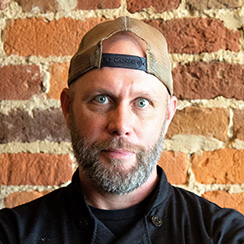 “My education with Escoffier has really given me a good foundation. It has filled a resume gap; it’s filled a professional gap and a skills gap. It has helped me in all aspects of my culinary career.”
“My education with Escoffier has really given me a good foundation. It has filled a resume gap; it’s filled a professional gap and a skills gap. It has helped me in all aspects of my culinary career.”
